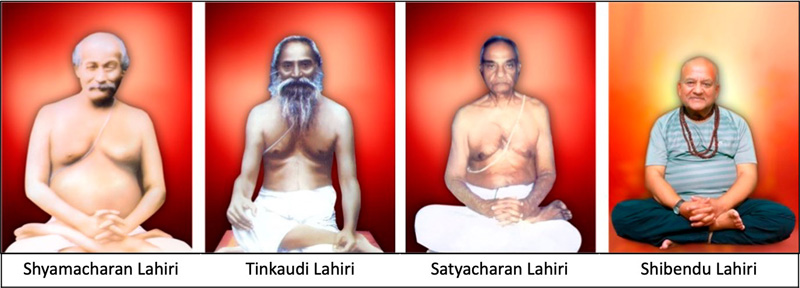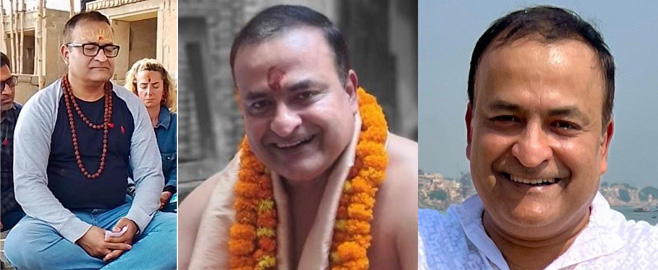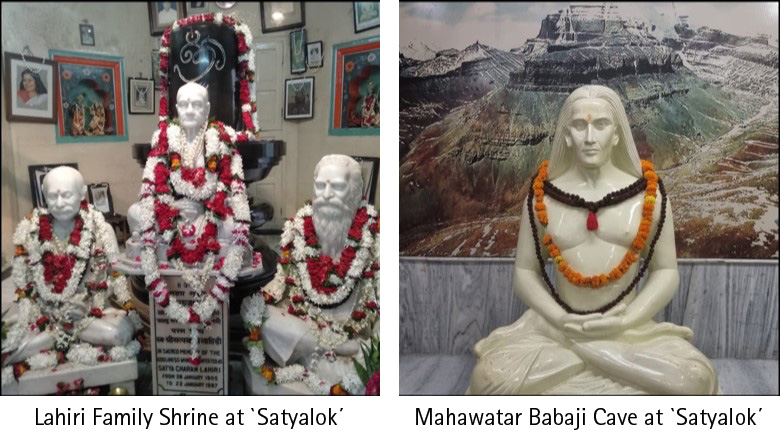KRIYA YOGA (DYNASTIC LINEAGE)
KRIYA YOGA IN THE LAHIRI MAHASHAYA FAMILY TRADITION
Lahiri Mahashaya's Kriya Yoga taught by his great-great grandson Ujjwal Lahiri
LAHIRI LORE
WHAT IS KRIYA YOGA?
Humanity has mastered the science of the material world yet remains largely ignorant of the science of the inner being. As a result of our relentless pursuit of material success and endless craving for more, life has become a struggle – marked by inner tension, turmoil, ache, agony, sorrow, and suffering. There are periods of happiness and mental peace, but they are fleeting, mere glimpses in an otherwise restless and distracted existence. While human thought has achieved marvels in the technical sphere, it has also given rise to a neurological defect: the separative psyche, the ego-centre. This centre has practical value for day-to-day functioning, but is not ‘real’ and breeds arrogance, aggression, animosity, and endless conflict at the psychological level. At its peak, this mischief of the human mind now endangers our very survival through nuclear and ecological crises. There is, therefore, an urgency of radical, spiritual renewal in the human mind.
Kriya Yoga is the science of the inner being. When one is initiated into this sacred science and practices its Kriyas with deep understanding, it becomes possible to evolve — from the sub-human to the human, and ultimately to the divine.
Through Kriya Yoga, it is possible for the "I"-ness, the separative consciousness we experience, to dissolve into a subtle individual uniqueness that also embraces the universal nature of existence. It restores harmony by piercing through the ignorance of the ways of the self, leading to a profound shift in the quality of day-to-day life. In the natural state that arises from Kriya practices, one remains in a state of calm and awakened awareness, no matter the external circumstances - like honey that returns to stillness even when disturbed, and unlike water, which becomes turbulent with disturbance.
ORIGIN OF KRIYA YOGA
The ancient Indian sage Patanjali, who lived between the 2nd century BC and the 4th century AD, is credited with authoring the Yogasutras, the definitive text on the whole philosophy of Yoga. In this work, the only yoga specifically mentioned by name is Kriya Yoga, suggesting that it may be the origin of the science of Kriya Yoga. The Gita also refers to some of the practices of Kriya Yoga.
This ancient science was almost lost over time. In the 19th century, however, a brahmin of Bengali origin, living in Varanasi rediscovered this science. Shri Shyama Charan Lahiri, who worked in the British military cantonment office at Ranikhet in the Himalayas, had a chance encounter with a saint (whom he addressed as Babaji) from whom he received profound teachings and practices that he termed as Kriya Yoga, in alignment with the Yogasutras of sage Patanjali. He was advised not to abandon the family and the household but be available to relationships as mirror for self-knowledge to reveal the cunning and complicated activities of our separative psyche, the divisive consciousness, so that a division free awareness- the Divinity indeed- may flower in human beings.
Thereafter a wonderful event happened which enabled him to get early retirement with pension facility. And thus, he returned home to Varanasi and began living as a quiet householder Kriya Yogi. He soon came to be called Lahiri Mahashaya and is known as the father of Kriya Yoga in modern times.
DYNASTIC LINEAGE OF KRIYA YOGA
The teachings and practices flowed in two streams: the ‘Vansha Parampara’ (dynastic lineage) and the ‘Shishya Parampara’ (disciplic lineage). In the Vansha Parampara, the sacred knowledge is passed down from father to son within the family bloodline of Lahiri Mahashaya, where the spiritual son is also the biological son, receiving initiation directly from his father. On the other hand, the Shishya Parampara involves the transmission of teachings from a Guru, as the spiritual father to his disciple, the spiritual son. The disciple then initiates more disciples and thus the stream flows.
In the dynastic lineage, the stream has continued in the age-old Rishi tradition of India from Lahiri Mahashaya to his son Tinkaudi Lahiri who initiated his son, Satyacharan Lahiri, who then initiated his son Shibendu Lahiri. Shibendu Lahiri has passed the teachings to his son, Ujjwal Lahiri, the present guru, who continues this sacred tradition. The Kriya Yoga teachings in this lineage remain in their purest form, as no modifications have been made to the Kriyas by any of the yogis in this stream. There was no formal organization during Lahiri Mahashaya’s time, and none exists even now, in the current generation of Ujjwal Lahiri. Veracity cannot be organized; only vanity and vested interests are. Kriya Yoga initiation programs for new aspirants are held at the private family shrine and temple, ‘Satyalok’ (meaning ‘Abode of Truth’) in Varanasi. Shri Ujjwal Lahiri was initiated here in 1987 by his father.
SHRI UJJWAL LAHIRI
In 2019, Shri Ujjwal Lahiri took over the responsibilities of the family lineage, following the instructions of his father and then-Guru, Shri Shibendu Lahiri, who stepped back due to his advancing age. Shibendu ji took Mahasamadhi in 2024.
Since 2019, Ujjwal ji has been guiding ‘sadhaks’ or aspirants from around the world through Kriya Yoga initiation programs in Varanasi. He also leads regular satsangs and retreats for ‘Kriyavans’ (i.e., those who have been previously initiated in the dynastic lineage).
Like his forefathers, Shri Ujjwal Lahiri is a householder yogi, living a life rooted in family responsibilities. Educated in prestigious institutions of India, as an electrical engineer from the Indian Institute of Technology (IIT), Kharagpur, and an MBA from XLRI, Jamshedpur, he has spent a professional career working in organizations in India and abroad. He has navigated his share of life’s ups and downs with calm detachment, embodying the spirit of a true yogi. His journey serves as a source of inspiration for many householder disciples on the path.
Shri Ujjwal Lahiri
WHAT KRIYA YOGA IS NOT?
It is not a physical fitness program. It is not based on any belief system and hence does not exclude people of any religion. It does not promote any sect or cult. Here the Guru is not a personality to be followed but a process in which the disciple flowers. No consolation or assurances of miracles are given or encouraged for the freedom must be found by and within each body. The guru here is merely embodied existence who provides the inspiration for transformation. No stories of miracles and magic are told to keep people amused in poor and paralyzing consolation.
KRIYA YOGA: FUNDAMENTAL SPIRITUAL PROCESS OF INDIA
In the Yogasutras, the first sutra of the Sadhana Pad (the Chapter on Practice) is “Tapah Swadhyaya Ishwara-Pranidhanani Kriya Yogah”, which means Kriya Yoga is a progression through Swadhyaya, Tapah , and Ishwara-Pranidhan. This basic progression is reflected in the three-day Kriya Yoga initiation programs.
Day 1 focuses on Swadhyaya—an exploration of the ‘Swa’, or the sense of “I”-ness, and what it means to be naturally established in Equanimity. This involves a deep inquiry into the movements of consciousness—such as desire, fear, greed, anger, envy, and the tendency to seek solace in belief systems.
Day 2 is dedicated to learning the Kriyas (practices), referred to as ‘Tapah’. For most people, being in a state of equanimity does not come naturally and practices are essential to nurture and consolidate that state.
Day 3 introduces ‘Ishwara-Pranidhan’ - the perception of a non-divisive, holistic dimension of awareness that offers a release from the stranglehold of fragmented, divisive consciousness that typically shapes our experience of life.
There are no fees since the process is priceless. As per India's ancient Guru-Shishya tradition, a voluntary Guru Dakshina (offering to the Guru) can be given to support practical expenses.
WHY KRIYA YOGA?
We often look for Truth in temples, mosques, gurudwaras, churches, and other places of worship. We go on pilgrimages, read sacred texts, and undertake intense austerities - all in an effort to free ourselves from pain and sorrow. Much of our lives are spent following one belief system after another, holding on to the hope that truth lies somewhere out there and if we search long enough, we will find it.
But in doing so, we miss a simple yet profound reality: we are already that which we seek. We are ‘Life’ itself - not the imagined construct called the ‘mind’. While the mind has practical value in day-to-day functioning, it is ultimately a myth when it comes to the deeper truth of our being. The invitation, therefore, is to stop seeking, and start seeing.
Kriya Yoga is perhaps the most powerful tool to reveal that our external search for Truth is futile. It’s not that we HAVE fear, pain, or guilt – we (our mental makeup, our conditioning) ARE the fear, the pain, and the guilt. Kriya Yoga consolidates this understanding by calming the agitations of the mind through simple, yet profound Kriyas (practices) that work directly on the body, and through the body, on the mind.
In this natural, effortless way, one gradually frees oneself from the interference of the mind and it becomes possible to truly observe and be aware of life. Freed from both belief and disbelief, one no longer runs away from problems but faces them with equanimity - resolving those that can be addressed through right action and deep understanding and accepting those beyond one’s control (such as the death of a beloved). In this state, one is fully ‘awake’.
WHO CAN BE INITIATED?
Kriya Yoga is an experiential and existential spiritual journey - one that is rooted on direct insight. As such, there are no formal pre-qualifications for initiation.
The only eligibility lies in a sincere ‘thirst’ for inner transformation, a good brain capable of deep understanding, the courage to question fearlessly, and the Himalayan patience to remain steadfast on the path. In Kriya Yoga, there are no shortcuts - only the depth of one’s own inquiry and practice.
Anyone, regardless of their religion or belief system—whether they are being initiated into Kriya Yoga for the first time or have previously been initiated through another lineage—is welcome. What matters is the willingness to begin from where one stands today.
There have been seekers who were earlier initiated through other disciplic traditions and have asked if it is appropriate to be initiated again. The response is simple: anyone who wishes to learn Kriya Yoga with full reverence for the traditions upheld at Satyalok is warmly welcomed. After all, if one takes a sacred dip in the Ganga at Haridwar, wouldn’t it be just as natural to take a dip at Gangotri glacier, the very source?
ORGANIZATION
As stated earlier, there is no organization in the dynastic lineage. The formation of organizations in spiritual matters is discouraged, emphasizing that truth tends to degenerate when managed by establishments where the ego of hierarchy is subtly reinforced. In keeping with this insight, the dynastic lineage maintains only a private family temple, with no formal organization—because Truth itself cannot be organized. Only concepts and interpretations of Truth can be structured.
However, coordinators in various regions assist with the practical aspects of organizing initiations, retreats, and other related activities throughout the year.
PROGRAMS AT SATYALOK, VARANASI
Initiation programs are held over 3 days at Satyalok, three times a year in January, July and October coinciding with Guru puja and Vedic ceremonies as per the traditional Indian calendar. The exact dates for a particular year can be found on the website www.kriyayogalahiri.com.
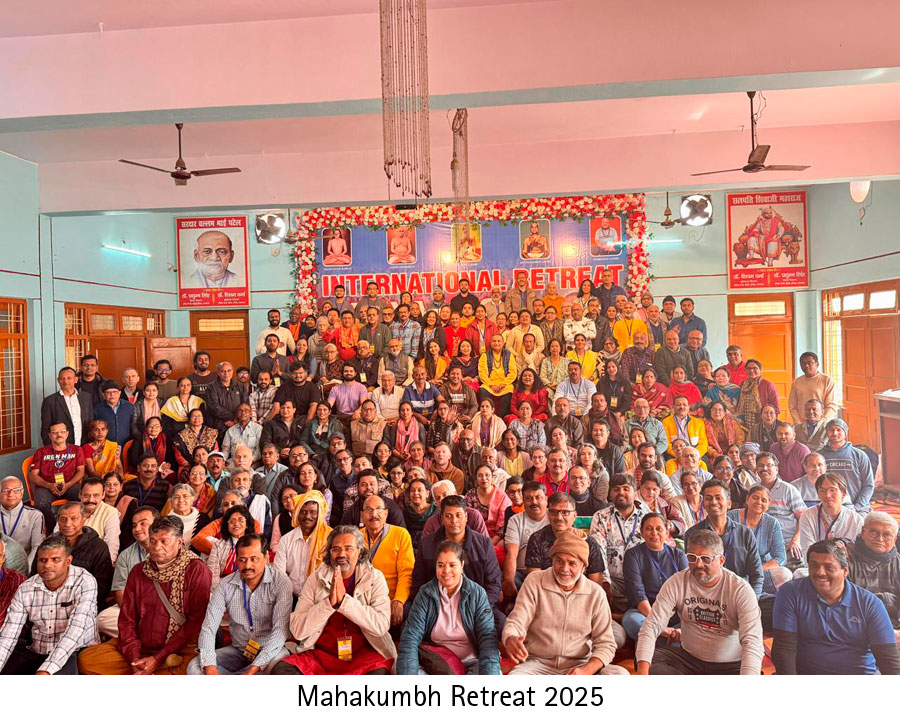
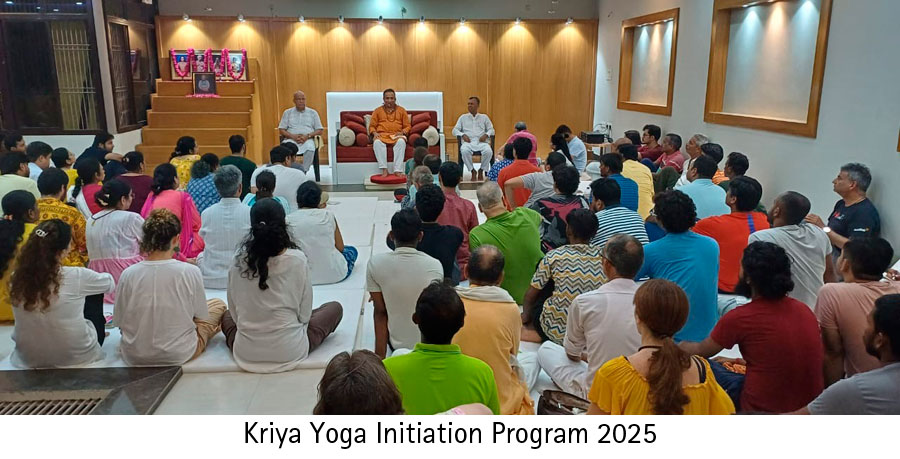
.
.
.
.
.
